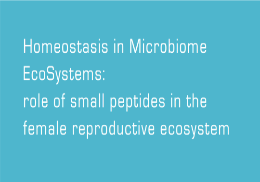Users
Social media
- More details here...
- Address
Parc Científic de la Universitat de València C/
Catedrático Agustín Escardino, 9
46980 Paterna (Valencia) Spain - Email:
iu.i2sysbio@uv.es - Phone:
(+34) 963544810
- Address
Links
Homeostasis in the microbiota: the role of peptides in the female reproductive ecosystem

Educaction
Seminar
Homeostasis in the microbiota: the role of peptides in the female reproductive ecosystem

MARIA LLUCH-SENAR.
Date: July 29, 2016.
Time: 12:30.
Place: Sala d’Actes dels Instituts (Capçalera Building, Scientific Park, Universitat de València).
Organizer: Institute of Integrative and Systems Biology I2SysBio (UV-CSIC)
Presented by: Marta Tortajada (marta.tortajada@biopolis.es).
Small open reading frames (smORFs), which encode proteins of less than 100 amino acids, are an emerging area of systems biology. smORFs are widely distributed throughout nature, including bacteria, animals and plants, and have been shown to have diverse functions. In bacteria, smORFs have also been shown to be involved in stress reactions, virulence regulation, sporulation, and quorum sensing. In fact, antimicrobial peptides (AMPs) are also expressed and secreted by insects, animals, plants and humans. Thus, bacteria can produce small peptides as virulence factors and eukaryotes can produce AMPs to combat bacterial infections. The question before us is how a balanced homeostasis occurs between bacteria and human ecosystem interfaces and what could be the role of these peptides in this. Epithelial interfaces are constantly faced with an immensely complex ecology of microorganisms (microbiome). Although specific bacteria are mutualistic inhabitants, their population needs to be strictly controlled to ensure that it remains benevolent rather than taking advantage of a weakened host. Losses in homeostasis lead to diseases such as bacterial vaginosis (BV) in the female reproductive system. In this sense, the main objective of our project is the identification of small peptides in the vaginal ecosystem to understand their role in the homeostasis of the female reproductive system ecosystem and, ultimately, modulate it and restore it to a healthy state in patients with BV.
About
Maria Lluch-Senar. CRG, PRBB, Barcelona
Maria Lluch-Senar graduated in Biotechnology (UAB) in 2004 and received a PhD in Biotechnology from the IBB (Institut de Biotecnologia i Biomedicina, UAB). He continued his research work at the Georg-August-Universität Göttingen in 2007 and at the Biological Systems Design Lab of Luis Serrano in 2013 (CRG, PRBB). She currently works as a scientist in this laboratory.
Images:




